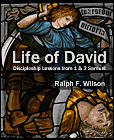
|
Old Testament
New Testament
Gospels
Acts
Paul's Letters
General Letters
Revelation
Topical Studies
Beginning the Journey (for new Christians). en Español

|
Old Testament
New Testament
Gospels
Acts
Paul's Letters
General Letters
Revelation
Topical Studies

|
Home
Bible Studies
Articles
Books
Podcasts
Search
Menu
Donate
About Us
Contact Us
FAQ
Sitemap
"They brought the ark of the LORD and set it in its place inside the tent that David had pitched for it, and David sacrificed burnt offerings and fellowship offerings before the LORD." (2 Samuel 6:17)
"After this I will return and rebuild
David's fallen tent.
Its ruins I will rebuild, and I will restore it...." (Acts 15:16)
What is the relationship to the tent (ʾōhel) David pitched for the ark and David's tent that will be restored?
James quotes a prophecy by Amos at the Council of Jerusalem (Acts 15:16-18).
"'In that day I will restore David's fallen
tent (sukkâ).
I will repair its broken places, restore its ruins,
and build it as it used to be,
so that they may possess the remnant of Edom
and all the nations that bear my name,'
declares the LORD, who will do these things." (Amos 9:11-12)
"'After this I will return and rebuild
David's fallen tent.
Its ruins I will rebuild, and I will restore it,
that the remnant of men may seek the Lord,
and all the Gentiles who bear my name,'
says the Lord, who does these things,
'that have been known for ages.'"(Acts 15:16-18)
The word translated "tabernacle" or "tent" or "booth" in Amos is sukkâ, "covert, thicket, booth, a temporary abode." It is often used in connection with the Feast of Tabernacles or Feast of Booths. Once a year the Israelite left his home to tabernacle in a 'booth'made from tree branches.[337] However, the term used in the Pentateuch for the "tent of meeting" and our passage, "the tabernacle that David had pitched for it" (6:17) is a different word (ʾōhel), the more common word for "dwelling, habitation, home," as well as "tabernacle, tent." It is used figuratively for David's palace (1 Kings 8:66; Isaiah 16:5).[338]
In our day you'll sometimes find a teaching in Pentecostal and Charismatic circles based on these verses to this effect. David instituted singing worship and prophecy in the tabernacle he pitched in Jerusalem (spelled out in 1 Chronicles 15). Amos'prophecy, quoted in the New Testament relates to the restoration of worship that is being fulfilled in our time.
David Allan Hubbard outlines four possible interpretations for "booth of David" in the Amos passage.
- Judah's Davidic dynasty, which had collapsed (fallen) at the hands of the Babylonians (which assumes a later date for Amos).
- Judah's Davidic dynasty's influence, which had been diminished ever since the dividing of the kingdom under Rehoboam.
- The City of Jerusalem, as depicted in Isaiah 1:8 as "a shelter in a vineyard, like a hut in a field of melons, like a city under siege."
- A return to the premonarchic period when David championed the cause of the peasantry before capturing Jerusalem. (Hubbard favors this interpretation.)[339]
- The restoration of worship conducted in "the tent David had pitched" (a view taught by some Pentecostal groups, not mentioned by Hubbard).
If you study it carefully, the Amos passage seems to require some kind of political interpretation, since the restoration includes possessing territory -- perhaps the same territory that David had ruled over in his prime.
 Available as a book in paperback, Kindle, and PDF formats. |
My own conclusion is that instead interpreting "the tabernacle of David" (in Amos and Acts) literally as "the tent David had pitched" for the ark -- thus speaking of a restoration of Davidic worship -- the Amos passage refers to a restoration of David's realm, that is the Kingdom of God that will be ushered in by the Messiah. Having said that, I do believe that God has been bringing a renewal of worship in the Church since the Charismatic Renewal of the 1960s and 1970s, though I don't think that's what Amos is referring to.
[337] R.D. Patterson, sākak, TWOT #1492d.
[338] Jack P. Lewis, ʾāhal, TWOT #32a.
[339] David Allan Hubbard, Joel and Amos: An Introduction and Commentary (Tyndale Old Testament Commentaries; Inter-Varsity Press, 1989), pp. 239-240.
Copyright © 2026, Ralph F. Wilson. <pastor![]() joyfulheart.com> All rights reserved. A single copy of this article is free. Do not put this on a website. See legal, copyright, and reprint information.
joyfulheart.com> All rights reserved. A single copy of this article is free. Do not put this on a website. See legal, copyright, and reprint information.

